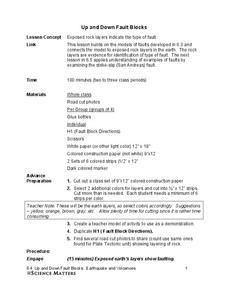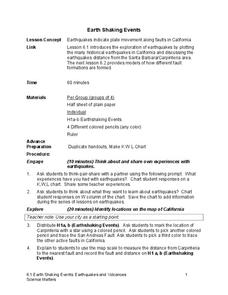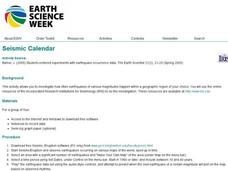Science Matters
Up and Down Fault Blocks
The Sierra Mountains in Nevada and the Tetons in Wyoming originally formed as fault block mountains. In order to visualize these fault blocks, pupils use construction paper to create layers of earth. They cut the paper models and form...
Science Matters
Earth Shaking Events
The world's largest measured earthquake happened in 1960 in Chile, reaching a terrifying 9.5 magnitude on the Richter Scale. The second lesson in the 20-part series introduces earthquakes and fault lines. Scholars map where previous...
Science Matters
Fault Formations
The San Andreas Fault moves about two inches a year, approximately the same rate fingernails grow—crazy! The third lesson in the series allows for hands-on exploration of various fault formations. Through the use of a Popsicle stick,...
Science Matters
Spaghetti Fault Model
Does increasing the pressure between two moving plates provide a stabilizing force or create more destruction? The hands-on lesson plan encourages exploration of strike-split fault models. The sixth lesson plan in a 20-part series...
Science Matters
Earthquake Preparedness
Forty-five states and territories in the USA are at moderate to very high risk of earthquakes. The discussion-based lesson covers what to do before, during, and after an earthquake. The 14th lesson in the series includes how to...
Science Matters
Slip Sliding Along
The San Andreas Fault is the largest earthquake-producing fault in California. In the seventh lesson in the 20 part series, pupils create maps of California, focusing on the San Andreas Fault system. The comparison of where...
Science Matters
Richter Scale
The 12th instructional activity in a series of 20 opens with a demonstration of exponential functions using pasta. This concept is connected to the Richter Scale, which is also an exponential function. Scholars compare the exponential...
Science Matters
A Model of Plate Faults
The San Andreas fault is one of the longest fault zones in the world. In a series of 20 lessons, the fourth lesson has pupils use a paper model to recreate various types of plate faults. Each is held in position then drawn...
Science Matters
Wave Watching
Seismologists use the direction and arrival times of p waves and s waves to determine the distance to the source of an earthquake. The engaging lesson has students line up to form human waves. Through different movements when attached,...
Science Matters
Finding the Epicenter
The epicenter is the point on the ground above the initial point of rupture. The 10th lesson in a series of 20 encourages scholars to learn to triangulate the epicenter of an earthquake based on the arrival times of p waves and s...
Science Matters
Earthquake Building/Shaking Contest
Japan is one of only a handful of countries that constructs buildings that are almost earthquake proof. The 13th lesson in the 20-part series challenges scholars to build structures to test against earthquakes. With limited materials and...
Curated OER
Volcanic Wrath
Students observe volcanic action using an internet Web site of satellite photographs. Stuents create a portfolio of observable features.
Curated OER
Earth Science Lesson Plans - The Hadean
Fourth graders review the Clock of Eras and learn about The Hadean. In this eras instructional activity, 4th graders study the characteristics of the first time period on the Clock of Eras; The Hadean. They watch a demonstration of a...
Curated OER
PLATE TECTONICS WITH AN ORANGE
Students explore the concept of plate tectonics. They experiment to prove and explain plate tectonics.
Curated OER
Tracking Current "Earth" Events
Eighth graders utilize Internet research skills, and practice their communication skills by presenting their research to the clas. They actively consider the types of hazards for humans associated with Natural Disaters and ways that...
Curated OER
Seismic Calendar
Young scholars discover how often earthquakes happen in a region of their choice. In this science lesson, students use online resouces to help them do their investigations. Young scholars make their own map of their region and show how...
Curated OER
Living With the Heat: The Ring of Fire
Students investigate the planet Earth's infamous ring of fire and the life that thrives from it. In this ocean environment lesson, students investigate hydrothermal vents and how organisms thrive off their heat. Students...
Curated OER
Using My Nasa Data To Determine Volcanic Activity
Young scholars use NASA satellite data of optical depth as a tool to determine volcanic activity on Reunion Island during 2000-2001. They access the data and utilize Excel to create a graph that has optical depth as a function of time...
Curated OER
Mean Meadian and Mode
Students apply central tendencies to given data. In this statistics lesson, students calculate the mean, median, and mode as it relates to their data. They collect data and graph it while identifying the way the numbers are ordered.
Curated OER
Metric System
Students solve problems using the metric system. In this algebra lesson, students convert between the metric system and the Imperial system. They use these two systems to solve real life problems.
Curated OER
Living With Disaster
Third graders identify and interpret natural disasters and act as experts to determine where the best location for a new farm would be. Students conduct research on an issue given as it relates to their area of expertise. Students...
Curated OER
Look at Those Leaves!
Students observe leaves. In this math and science cross-curriculum leaf instructional activity, students take a nature walk and collect leaves. Attributes are assigned and leaves are sorted in various ways. Students use non-standard or...
Curated OER
Language Arts: Inside, Outside, Upside Down
Students create a computer slide show of pictures representing directional words. After listening to several books with examples, they pair words such as inside and outside, below and above, or high and low. With older students or...
Curated OER
In the Rain Shadow
Students charts the rainfall averages on either side of a mountain range. In this water cycle lesson plan, students discover that mountain ranges affect weather patterns. Students pretend they are air traffic controllers and...
Other popular searches
- Types of Volcanoes
- Volcanoes and Earthquakes
- Shield Volcanoes
- Erupting Volcanoes
- Science Project Volcano
- Composite Volcanoes
- Internet Research Volcanoes
- Volcano Word Search
- Volcano Math Lesson
- Volcanoes Earthquakes
- Caribbean Volcanoes
- Dome Volcano























